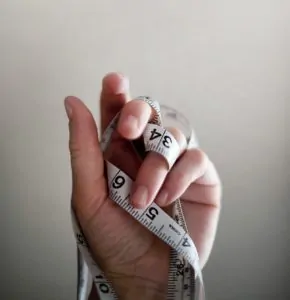We love ‘em, we need ‘em, and they literally keep us going all day long … but calories can also quickly become a source of confusion and frustration when we’re trying to lose weight.
If you think of your body as a machine, calories are its fuel, and you get that fuel from your diet. When it comes to your weight, the number of calories you eat is a delicate balancing act – too much, and you could gain weight, while eating less means that you can start to burn fat … but if you eat too few, your body might begin to hold on to fat because it perceives that you’re in a “famine.”
Simply put: anyone who’s ever tried to lose weight knows how big of a role calories play in the weight loss equation. So here’s a simple equation for figuring out how many calories you need every day when you’re trying to lose weight, plus some information on what those calories should actually be composed of for the best results.
How Calories And Weight Loss Are Related

Everyone has a Basal Metabolic Rate (BMR), which is the number of calories your body burns every day when it’s at rest. In other words, if you weren’t exercising or moving around much, this amount of calories would be how much energy your body needs to do all its other essential functions like keeping your heart running, lungs working, digesting, etc.
Then, your physical activity is going to increase the number of calories you burn since moving around and working hard requires more energy. So you are generally burning more calories every day than your BMR.
Here’s where your diet comes in: if you eat more calories per day than you burn, that unused energy has to be stored somewhere, so your body saves it as fat to be used later when you need it. On the other hand, eating fewer calories than you burn every day means that your body needs to find another source of energy, which is where it starts to burn your fat stores and lead to weight loss.
A word of caution, though: eating too few calories isn’t the right way to lose weight, since that can lead to nutrient deprivation. If that’s not scary enough, eating an unhealthily low number of calories every day doesn’t mean that you’re going to lose more fat: you’re probably going to lose more muscle mass instead, which then lowers your metabolism and makes it even harder to lose weight. And even if you get to your goal weight, it’s that much harder to maintain.
So it’s a delicate balance, and knowing how many calories you need is a good way to approach weight loss in a healthy way.
A Simple Equation To Determine Your Calories For Weight Loss
A general rule of thumb is that you need to be at a caloric deficit of 3,500 calories in order to lose one pound of weight, and that deficit should be spread out throughout a couple of days for the best results. [*]
For most people, a caloric deficit of 500-1000 calories per day is enough to lose a healthy amount of weight (around 1% of your body weight, or roughly 1-2 pounds per week for most people).
So to determine how many calories you need for weight loss, you need to figure out how many calories you use per day, then subtract around 500-1000 calories.
One of the most dependable equations for this is the Benedict-Harris formula, which looks like this:
- Males = 66 + (6.3 x body weight in lb) + (12.9 x height in inches) – (6.8 x age in years)
- Females = 655 + (4.3 x weight in lb) + (4.7 x height in inches) – (4.7 x age in years)
This gives you your BMR, which you can then multiply by your activity level to factor in the calories you burn from your physical activity:
- Sedentary: 1.2
- Mild activity: 1.375
- Moderate activity: 1.55
- Heavy activity: 1.7
- Extreme activity: 1.9
The resulting number gives you an estimate of how many calories you burn per day. Then, subtract your calorie deficit (around 500-1000 calories) for the number of calories you should be eating every day to achieve a healthy weight loss!
Determining Your Macros
Of course, eating 1500 calories of potato chips every day isn’t going to be a healthy weight-loss strategy. In addition to paying attention to your calories, you’ll also want to make sure that you’re eating the right balance of carbohydrates, proteins, and fats every day – otherwise known as your macronutrients, or macros for short.
There is plenty of research and debates about the “ideal” macros you should be eating, and the bottom line that it’s pretty inconclusive and people have lots of different opinions. For example:
- Some research suggests that a 50% carb, 35% protein, 15% fat diet is best for fat loss,
- But standard Keto diet advocates like a 5-10% carb, 15-20% protein, 75% fat diet instead
Whatever you decide the right macros are for you, it’s simple to figure out how many calories of each you should be eating when you know how many total calories you need to eat to lose weight.
All you have to do is simply multiply the percentage of the given macro by the number of calories you should be eating.
For example, let’s take someone who finds that they should be eating 1,800 calories a day for an effective weight loss, and he determines that he should be following a diet with 50% carbs, 15% fats, and 35% protein.
To calculate:
- 50% Carbs = 1800 x 0.50 = 900 calories from carbs
- 15% Fats = 1800 x 0.15 = 270 calories from fat
- 35 % Protein = 1800 x .35 = 630 calories from protein
From here, he has the right information to plan out his diet. Nutrition and macro-tracking apps can be really helpful to help you figure this all out, since it can be time-consuming to calculate everything yourself.
Bottom Line
Calorie requirements are going to vary from person to person, but one thing remains the same: the right caloric deficit is a crucial ingredient for healthy weight loss. Knowing your own calorie needs is a surefire way to make the right diet and exercise plans to get to where you want to be!
